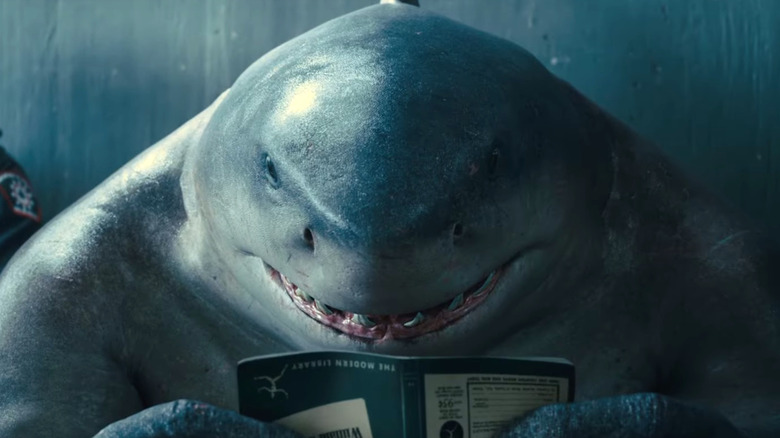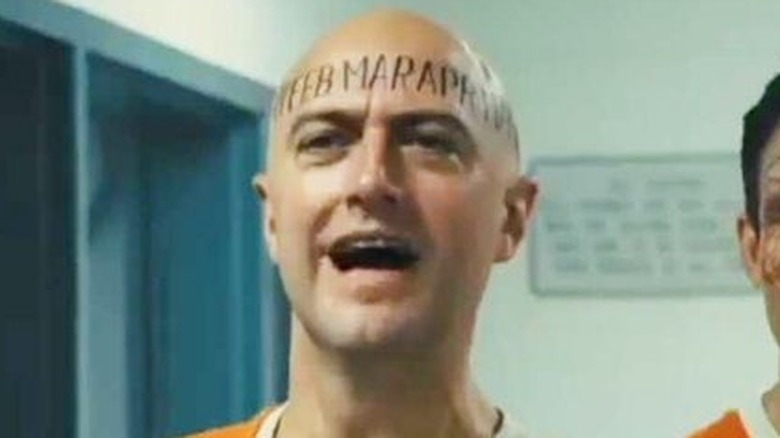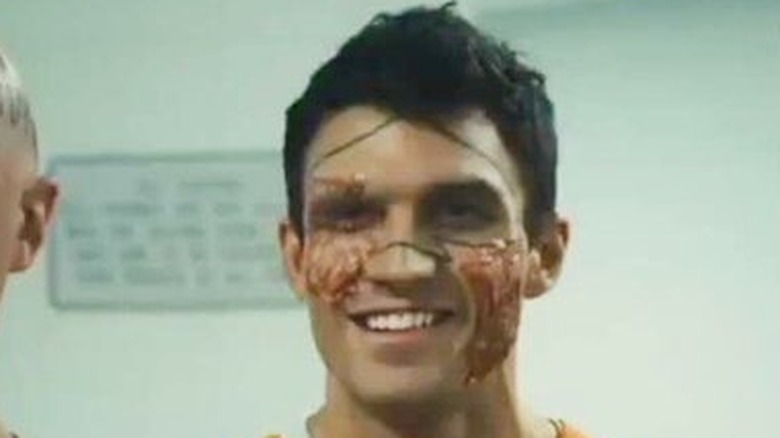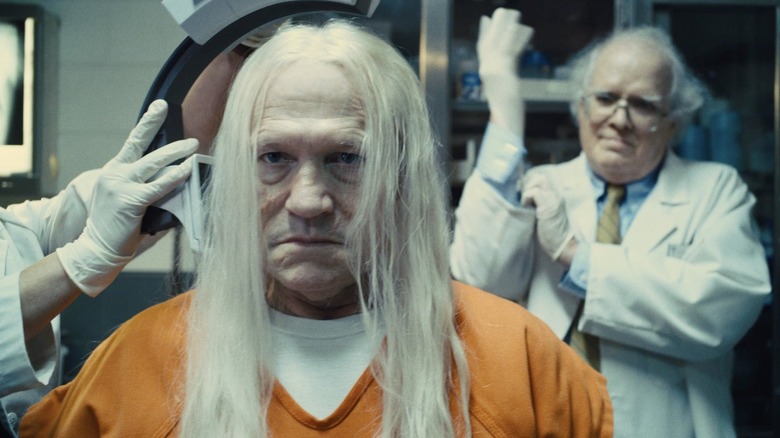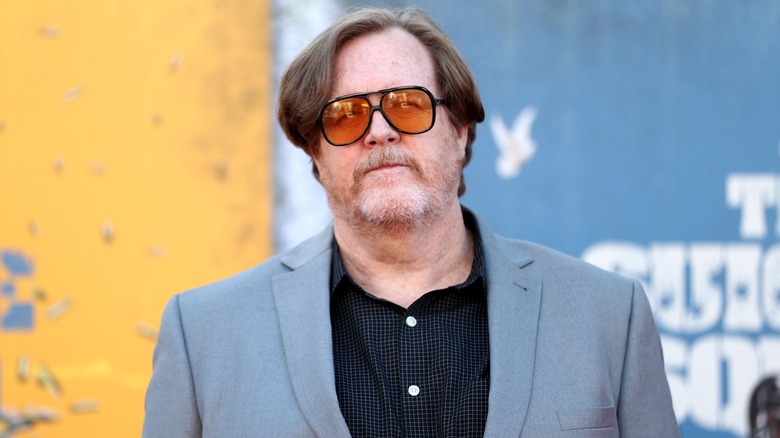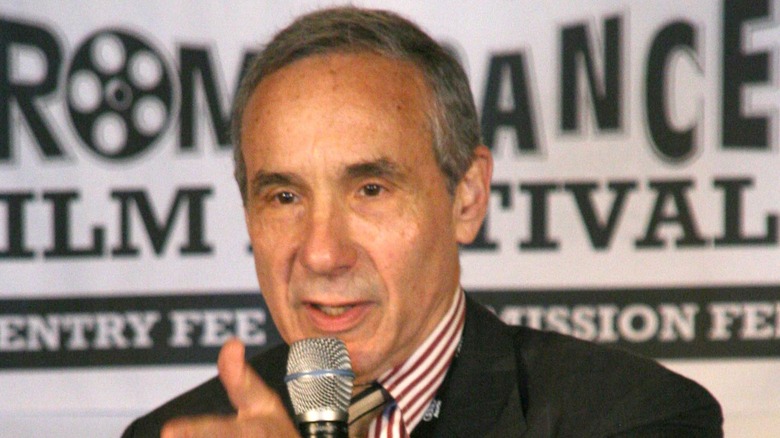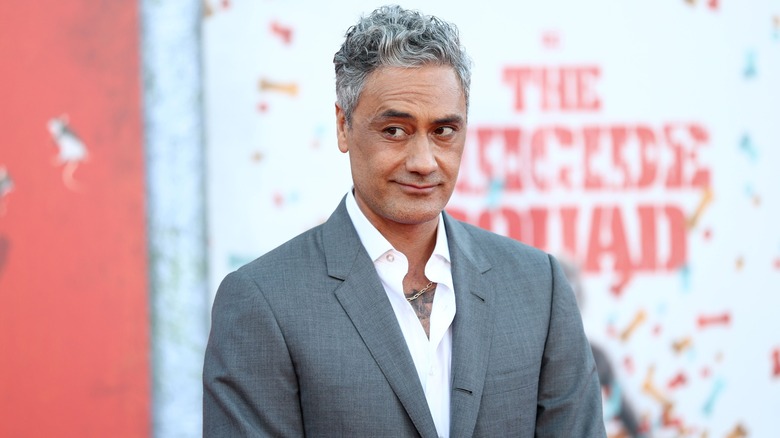Characters In The Suicide Squad That Mean More Than You Realize
It's hard to argue that any character in "The Suicide Squad" has any meaning. It's a combination of low grade villains/anti-heroes fighting against an enemy military force invented almost from scratch. Director James Gunn himself stated on Twitter that "I wanted to stick with ["Suicide Squad" comics writer John] Ostrander's original vision of mostly second-rate antagonists. There's an innate tragic element to supervillains who aren't even that good at being bad." This goes beyond the named characters and the meta-humans: Even the citizens and ruling class of Corto Maltese, earlier introduced as a minor location in "The Dark Knight Returns," bear little resemblance to what's seen in the comics. As such, the movie is made up of relative nobodies by design — often with different backstories.
That said, we were able to pinpoint some characters — outside the core cast, at least — that are more meaningful than meets the eye. A few of these are villains with larger backstories, a couple have more nuance than is shown, and one is a big-time important cameo. Here's how these characters mean more than you realize.
Calendar Man
Calendar Man, played by Sean Gunn, shows up as a prisoner who mocks Polka-Dot Man. Given the events of "The Suicide Squad," a little comics know-how shows that this foreshadows Polka-Dot Man's evolution over the movie.
Calendar Man's calling card is that he's obsessed with calendars and dates, often planning his crimes on days of specific significance. There's no way or need to sugar coat this: that is an extremely stupid gimmick for a villain. Even among Batman's rogues' gallery, which includes a man who loves riddles, he may represent the nadir.
Or at least, he represented that nadir until the classic Batman story "The Long Halloween" (1996-97), which finds Batman tracking down a mysterious killer who's murdering a new victim every month, and the only person who knows the killer's identity is Calendar Man. In a role often compared to that of Hannibal Lecter in "Silence of the Lambs," Calendar Man drops hints from his cell in Arkham Asylum.
Much like the way "The Long Halloween" proved Calendar Man's worth, "The Suicide Squad" is the vehicle that elevates Polka-Dot Man beyond joke status. Gunn included Polka-Dot Man after Googling "dumbest supervillain of all time" — and proceeded to give the formerly maligned villain a compelling backstory. Calendar Man is laughing at what he once was.
Double Down
Double Down, played by Jared Leland Gore, joins Calendar Man in his mockery of Polka-Dot Man. Unlike Calendar Man, however, Double Down has never had a reinvention or reintroduction, and has remained a throwaway gimmick villain. Whether Gunn wanted another goofy villain to laugh at Polka-Dot Man or is setting up a potential future Task Force X member is hard to say, but his goofiness is worth acknowledging.
Double Down, in his limited appearances, has largely been a villain who battles the Flash. He was a con man and semi-professional gambler, because nothing makes for a good villain origin like three card monte. He encountered a cursed deck of cards, which gave him his powers — all of which are weird card gimmicks, most of which involve throwing them. Listen, we promised interesting, we didn't promise fleshed out.
Doctor Fitzgibbon
Doctor Fitzgibbon is one of the doctors working for ARGUS. Among his many duties are inserting the nanite bombs that act as Waller's insurance into the skulls of Task Force X members. The character is only glimpsed briefly, but the role itself isn't important. Rather, it's the person playing him: John Ostander, the man responsible for some of the best and most important Suicide Squad comics.
Gunn noted on Twitter that Ostrander is a former actor, which made the role easier. Gunn is also on record saying that "Ostrander's Suicide Squad is the biggest influence on the film (along with Aldrich's "The Dirty Dozen") ... We had a huge poster of this in our production office while shooting."
The 2016 "Suicide Squad" movie also honored Ostrander, naming the skyscraper attacked by the original Task Force X the "John F. Ostrander Building."
John Economos
John Economos, played by comedian Steve Agee, is the warden of Belle Reve. It's a minor role — he shows up long enough to prove he's competent at what he does and that he hates Peacemaker. He has a similar role on the comics, debuting in "Suicide Squad" #1 (1987) with the same job, and has shown up two or three times each decade since the end of Ostrander's run.
There's admittedly not a ton of depth to his character, but it's not his character that's important. Rather, it's Agee himself, who pulls double duty in this movie: he was also the stand-in for King Shark. "I was tall," Agee told ComicBook.com. "[Gunn] needed somebody tall. Like, literally needed somebody tall." Polka-Dot man actor David Dastmalchian said that "Steve is a great actor all across the board, but he's also just a brilliant comedian and improviser" and also noted that Agee was an early casting decision.
A white haired man at the bar
When Task Force X stops by a bar to grab a few drinks, they find a few dozen other people there with them. No big deal — it's a bar, of course there's a ton of patrons. One, however, stands out above the rest. There's a man with white hair seen dancing with several women. If you missed him in the film itself, you can go back and catch him in one of the trailers for "The Suicide Squad." Though the character is never given a name, the actor playing him is one of the most important people in James Gunn's career: schlock horror legend Lloyd Kaufman.
Kaufman is the founder of Troma Entertainment, best known for bringing us the Toxic Avenger. Gunn's film career started at Troma in the 90s, when he co-wrote the screenplay for "Tromeo and Juliet." Gunn once tweeted that "Troma was a crash course in everything about making movies, from writing a script to casting to location scouting to production to marketing the film," adding that without Kaufman, "I certainly wouldn't have the all-around education I needed to be a film director." Gunn has repaid Kaufman by giving his mentor cameos, including a small part in "Guardians of the Galaxy."
Kaufman once told Vice that "[Gunn] put me in all these movies so far and now he's the number one guy at the box office! Like that Titanic guy, you know? 'I'm the king of the world!' Only James would never say that cause he's such a nice guy."
Ratcatcher I
The first Ratcatcher only appears in two scenes, albeit two of the most emotional scenes in "The Suicide Squad." Played by Taika Waititi, Ratcatcher is often spoken of in reverent tones throughout the film — or at least as reverent as people can be about an ostensible villain who controls rats. Like many of the characters in "The Suicide Squad," Ratcatcher is a reimagining of a low-tier DC Comics villain of the same name.
The Ratcatcher of the comics comes from Gotham City rather than Portugal. He was an actual rat catcher by trade before, like seemingly half of Gotham City, he turned to crime. He also had the ability to speak with and control rats, but his most valuable ability was his encyclopedic knowledge of Gotham's sewer system, which let him move around the city with ease and use his rats to get him whatever he needed outside the eyes of the public and/or Batman. He's a much less vulnerable figure than we see in "The Suicide Squad."
